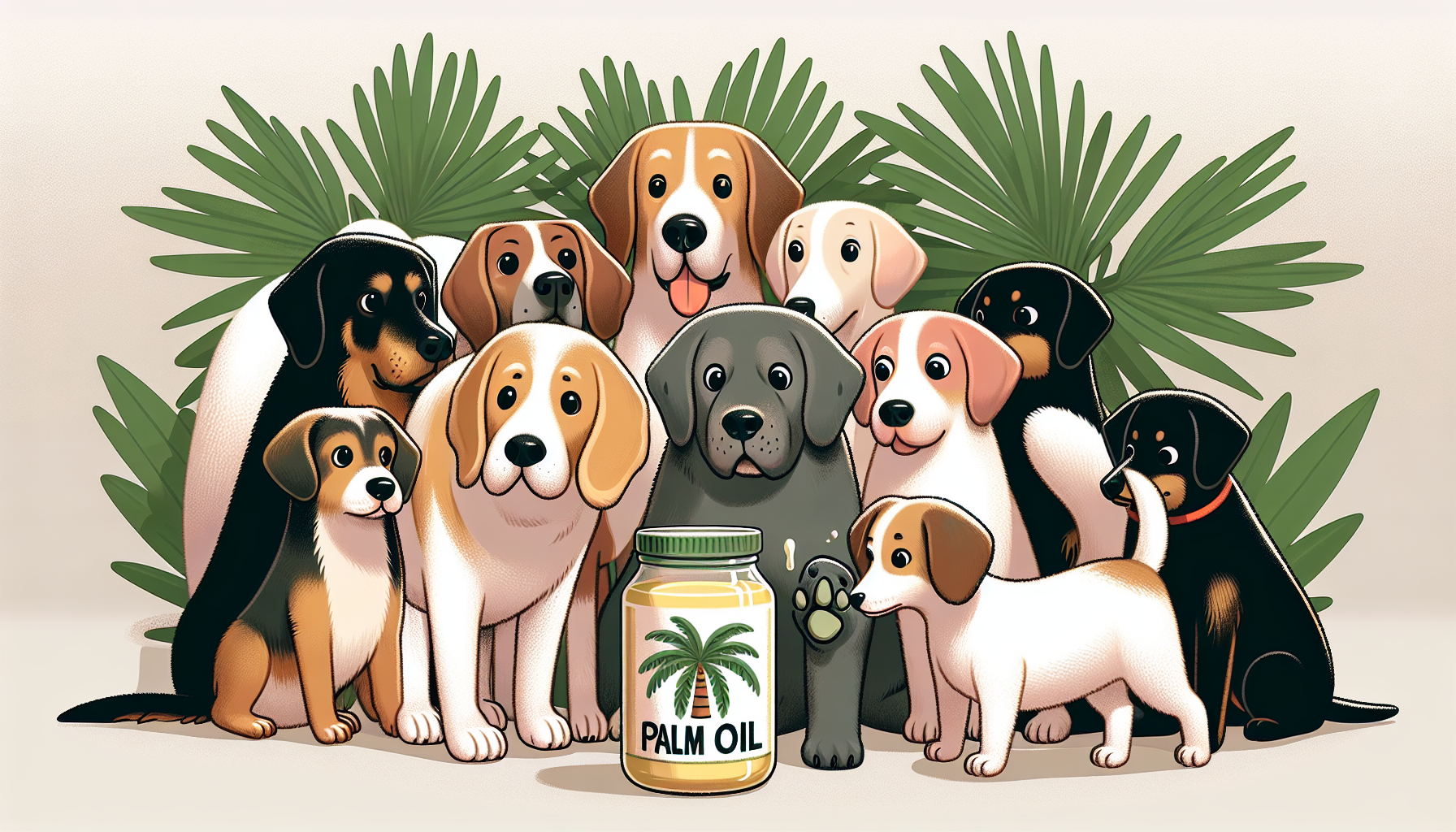Hello, my fellow dog parents! Today we delve into the nitty-gritty about palm oil and our fur-babies. I know how much we all love our pups, and it seems there’s always a new ingredient to be wary of. Today, it’s all about palm oil. So let’s sink our teeth into the question, “Can dogs have palm oil?”
When it comes to palm oil, it’s crucial to weigh its pros and cons. According to several vets, palm oil is not suitable for dogs. A little might not cause serious harm immediately, but consistent ingestion could lead to health issues. Palm oil can cause a variety of symptoms in dogs, from diarrhea to severe blockages in the gut, making it potentially toxic for our beloved pets. But let’s dig deeper.
Do you want to know more about dogs and palm oil? Then use the table of contents below to jump to the most relevant section. And you can always go back by clicking on the black arrow in the right bottom corner of the page. Also, please note that some of the links in this article may be affiliate links. For more details, check the Disclosure section at the bottom of the page.
Here's what we'll cover:
- What is Palm Oil, and Why is it a Concern for Dogs?
- Why Should Dog Owners Be Cautious About Palm Oil?
- Can dogs have a little palm oil?
- Identifying Symptoms of Palm Oil Ingestion in Dogs
- What to Do If Your Dog Ingests Palm Oil?
- How Can Dogs Come Into Contact with Palm Oil?
- What Are the Potential Risks and Health Issues for Dogs?
What is Palm Oil, and Why is it a Concern for Dogs?
Palm oil is an edible vegetable oil that comes from the fruit of oil palm trees. It’s a common ingredient in human food, including some we love to share with our dogs—like peanut butter. Worrisomely, palm oil is present in numerous dog foods, treats, and supplements too. The concern comes from the negative effects palm oil can have on our dogs. Palm oil is not inherently poisonous, but when a dog eats too much, the high-fat content can cause digestive issues or, in extreme cases, possibly lead to pancreatitis.
Understanding the Composition of Palm Oil
This widespread ingredient is high in saturated fats. It goes beyond fattening our dogs, as it can be bad for dogs for a myriad of health reasons. The fats in palm oil contribute to obesity and can influence the dog’s lipid profile negatively if consumed regularly.
How Does Ingesting Palm Oil Affect Dogs?
When a dog has eaten palm oil, it can cause various symptoms from mild to severe. These include vomiting, diarrhea, dehydration, and in extreme cases, blockages in the gut. If your pet has ingested palm oil found on the beach, call your vet immediately. In addition to the high-fat content, palm oil released into the sea can pick up various toxic pollutants that can make your dog sick.

Why Should Dog Owners Be Cautious About Palm Oil?
Many dog owners may not even realize they need to be cautious when it comes to palm oil in dog foods or treats. But with its potentially harmful effects on our pets, awareness is crucial. The high-fat content and the fact that palm oil can cause digestive issues means we need to be careful about what our dogs are eating.
Can dogs have a little palm oil?
Ah, the million-dollar question! Technically, a dog can ingest a small amount without it being immediately harmful. However, because the oil is so high in fat, even small amounts can upset their stomach. Remember, just because your dog isn’t immediately showing signs of illness doesn’t mean the palm oil isn’t hurting them. Be sure to run everything by your vet to ensure your pet’s safety! In the end, when it comes to our pups, it’s always better to be safe than sorry. Let’s keep palm oil off our pets’ meal plans and ensure they stay happy, healthy, and frisky.
Identifying Symptoms of Palm Oil Ingestion in Dogs
As a dog mom, one always dreads the thought of their fur baby accidentally consuming something harmful. If a dog decided to chew and then swallow a lump of pure palm oil, it can be toxic to dogs. But how can your dog tell you about its discomfort? Look for symptoms such as diarrhea, dehydration, unusual agitation, and the dreaded condition known as pancreatitis.
What to Do If Your Dog Ingests Palm Oil?
Let’s get one thing straight: if your dog ingests palm oil, don’t sit on the problem. Please contact your vet immediately! Dogs’ digestive systems can struggle with the high fat and sugar content of palm oil, potentially leading to blockages in the digestive system. The consequences can be severe, maybe even fatal, which is why professional vet help should be your first port of call.
How Can Dogs Come Into Contact with Palm Oil?
Palm oil is a substance that can be found in some dog treats, an innumerable number of human-food products, and, to our surprise, even in toiletry and cleaning items. This means your dog – appreciator of treats and investigator of all kinds of smells – is pretty much surrounded by it. Like a general in battle – knowledge is power, so it’s essential to know where the enemy lurks!
Palm Oil on Beaches: How Does it Pose a Threat to Dogs?
Sounds pretty random, right? Would palm oil be doing on a beach, of all places? You see, it also gets discharged into the sea by ships, often traveling in oil waste form. Now imagine it washing up on your favorite beach in a semi-solid state, contaminated by bacteria and waste, looking similar to delicious-smelling chonky rocks. You’ve got yourself a tempting, yet toxic to dogs treat that would be hard for your dog to resist.
Presence of Palm Oil in Human Food and its Impact on Dogs
Dogs do love a chunk of whatever their humans consume. Unfortunately, palm oil is ubiquitous in human food due to its semi-solid texture and how cheap it is. If it ends up in your diet, it could easily end up in your dog’s, too, with potentially harmful effects. Despite its potential health benefits to humans, it’s not suitable for our canine friends due to its high fat content and potential for toxicity.
Risks of Palm Oil Contamination in Dog-Related Products
Let’s face it. The dog-related product market is vast, but its vastness doesn’t automatically equate all items to being safe or palm oil-free. Often, products like dog treats may contain palm oil, putting your pooch at risk of the aforementioned symptoms and conditions. Some pet products are not OBVIOUSLY contaminated or labelled, which calls for careful assessment and a cautious approach while shopping.
Why is palm oil in dog treats?
Palm oil, thanks to its high fat content, adds flavor and a certain irresistible chewiness to dog treats. But besides the deforestation issues it causes, it does pose health threats to dogs. So next time when you’re out shopping, remember to look for dog treats that don’t contain palm oil. I’ll sign off with this – a treat’s real worth is in its safety and the joy it brings to your dog, not in its fat content.
What Are the Potential Risks and Health Issues for Dogs?
Firstly, it’s important to discern that not all palm oil is inherently bad for dogs. The risk largely depends on how it’s processed, its source, and the quantity ingested. Palm oil can be found in many edible products and in various types like RSPO-certified, which signifies sustainable production. However, it’s also used as a biofuel and a binder in fuel waste products. Ingesting these biofuel-bound or fuel waste palm oil variants can pose serious health risks for dogs.
Blockage and Digestive Issues Caused by Ingesting Palm Oil
Palm oil, particularly in its semi-solid form, can cause blockages in a dog’s digestive system. How so? Well, imagine a waxy, white lump (that’s what palm oil looks like on a beach post-spillage) going down Rover’s pipe. It’s hard to digest for their bodies, which, I should mention, are designed to chow down anything from bones to kibble. This can lead to intense discomfort, vomiting, and severe cases may need veterinary intervention to alleviate the blockage.
Toxicity and Harmful Effects of Pure Palm Oil on Dogs
Can palm oil be toxic for dogs? The answer is yes, depending on the source and quantity. This is especially true when they ingest palm oil laced with artificial sweeteners or in large quantities. These elements can pose significant health risks, including toxicity and poisoning. Ingesting palm oil can upset a dog’s stomach and in many cases cause them to vomit. It would be best to get your pup to the vet immediately if you suspect any palm-oil related ingestion.
Link Between Palm Oil and Pancreatitis in Dogs
Evidence suggests that eating palm oil can trigger pancreatitis in dogs. Pancreatitis, inflammation of the pancreas, starts with vomiting and progresses to severe abdominal pain. If you notice your fur baby acting unusually lethargic, looking ‘off’ or experiencing bouts of vomiting, you may have a case of pancreatitis. In such instance, don’t procrastinate. Call your vet pronto!
Dehydration and Other Health Concerns Due to Palm Oil Ingestion
Palm oil, known for its laxative effect, can cause digestive upset leading to dehydration in dogs. It’s also high in fat, contributing to other health issues like obesity. But, without sounding alarmist, let me put it this way: palm oil doesn’t have to be legally condemned. Small amounts, and I mean really small quantities, probably won’t harm your pup. The real problem arises when dogs ingest large quantities, either unintentionally or because they can’t resist the smell and taste of this oil.
Consulting a Vet Immediately for Palm Oil-Related Health Complications
If you notice any drastic changes or discomfort in your furry friend, I would suggest consulting your vet immediately for palm oil-related health complications. Given the wide range of side effects and issues, your action speed can make a sizeable difference in treatment and recovery. Remember, palm oil can be very tricky and harmful and it’s not just the jar in your pantry. Many a time, it’s the mishandled fuel waste on the beach your doggy might take a bite of!
Thanks for the blog graphics: Canva.com
Doghint.com is a participant of several affiliate programs. The list includes (but not limited to) the following: VigLink, Refersion, ShareASale, and Amazon Services LLC Associates Program, an affiliate advertising program designed to provide a mean for us to earn fees by linking to Amazon.com and affiliated sites. Doghint.com does not intend to provide veterinary advice. All published articles are meant for informational purposes only and not substitute the professional veterinary consultation.


